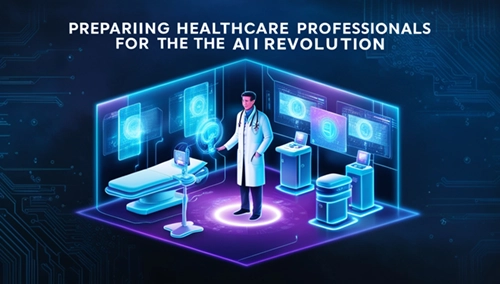Artificial Intelligence (AI) is poised to revolutionize healthcare, enhancing diagnostic accuracy, treatment planning, and patient care. However, the successful integration of AI into healthcare systems hinges on the readiness of healthcare professionals to effectively use these technologies. Educational institutions play a critical role in preparing the next generation of healthcare professionals to navigate this AI-driven landscape. Here are key strategies they can adopt, supported by insights from recent studies and expert opinions.
1. Integrating AI into Medical Curricula
Curriculum Development:
Educational institutions should embed AI and data science courses into medical curricula. This includes foundational courses on AI principles, machine learning, and data analytics, tailored to the healthcare context. A study by Topol (2019) highlights the importance of understanding AI technologies to leverage them effectively in clinical settings .
Practical Training:
Hands-on training is crucial. Medical students should engage in practical projects that involve AI applications in healthcare, such as predictive analytics for patient outcomes and AI-driven diagnostic tools. A curriculum that balances theory with practice ensures that students are not only knowledgeable but also skilled in using AI technologies.
Interdisciplinary Collaboration:
Collaboration between medical schools and engineering or computer science departments can foster a comprehensive learning environment. Joint programs and courses that involve both medical and technical faculties can provide a holistic education, preparing students to work in interdisciplinary teams. The necessity for such collaboration is underscored by research indicating that diverse expertise is crucial for effective AI implementation in healthcare .
2. Fostering a Culture of Lifelong Learning
Continuous Education:
Healthcare professionals must engage in lifelong learning to keep pace with the rapid advancements in AI technology. Institutions should offer continuous education programs, workshops, and certifications focused on the latest AI developments and their applications in healthcare. This approach aligns with recommendations from the World Health Organization, which emphasizes ongoing professional development to maintain competency in evolving fields .
Online Learning Platforms:
Utilizing online platforms can make continuous learning more accessible. MOOCs (Massive Open Online Courses) and virtual workshops can provide flexible learning opportunities for professionals worldwide. A study by Harvard Business Review indicates that online learning platforms significantly enhance accessibility and allow for personalized learning experiences .
3. Promoting Research and Innovation
Research Opportunities:
Educational institutions should encourage and support research initiatives that explore new AI applications in healthcare. This involves providing resources and funding for research projects, fostering an environment where students and faculty can innovate. The integration of AI in medical research is crucial for developing new technologies and improving existing ones, as highlighted by a comprehensive review of AI in medical research.
Innovation Hubs:
Establishing innovation hubs or labs dedicated to AI in healthcare can serve as a breeding ground for new ideas and technologies. These hubs can facilitate collaboration between students, researchers, and industry professionals, promoting the practical application of AI research.
4. Addressing Ethical and Practical Considerations
Ethics Education:
Understanding the ethical implications of AI in healthcare is vital. Courses on medical ethics should include modules on AI ethics, covering topics such as data privacy, algorithmic bias, and the ethical use of AI in patient care. A review by The Lancet Digital Health emphasizes the importance of ethics education in mitigating the risks associated with AI technologies .
Simulated Environments:
Simulated clinical environments where students can practice using AI tools in a controlled setting can help bridge the gap between theoretical knowledge and real-world application. These simulations can include scenarios involving AI-driven diagnostic tools and treatment planning systems, allowing students to experience firsthand how AI can augment clinical decision-making.
Conclusion
Preparing the next generation of healthcare professionals to work effectively with AI technologies requires a multifaceted approach. By integrating AI into medical curricula, fostering a culture of lifelong learning, promoting research and innovation, and addressing ethical and practical considerations, educational institutions can ensure that future healthcare professionals are well-equipped to harness the power of AI. This preparation is not only essential for improving healthcare outcomes but also for ensuring that AI technologies are used ethically and effectively in clinical practice.
References
1. Topol, E. J. (2019). High-performance medicine: the convergence of human and artificial intelligence. Nature Medicine, 25(1), 44-56.
2. Aungst, T. D., & Patel, R. (2020). Integrating digital health into the curriculum—considerations on the current landscape and future developments. Journal of Medical Education and Curricular Development.
3. World Health Organization. (2019). WHO guideline: recommendations on digital interventions for health system strengthening.
4. Choudaha, R. (2021). How online learning platforms are reshaping education. Harvard Business Review.
5. Hamet, P., & Tremblay, J. (2017). Artificial intelligence in medicine. Metabolism, 69, S36-S40.
6. Mittelstadt, B. D., Allo, P., Taddeo, M., Wachter, S., & Floridi, L. (2016). The ethics of algorithms: Mapping the debate. Big Data & Society, 3(2), 2053951716679679.







